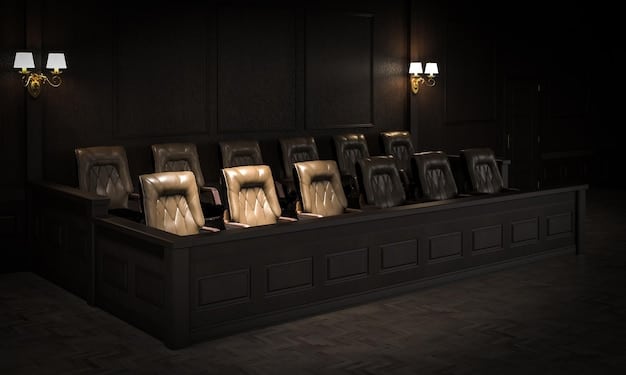Korean Drama Copyright: US Distribution Legal Battles

Korean drama legal battles in the US distribution context primarily revolve around copyright issues, including unauthorized streaming, downloading, and distribution, which can lead to significant legal and financial repercussions for infringers.
The global popularity of Korean dramas, or K-dramas, has surged in recent years, leading to increased distribution in the United States. However, this expansion has also brought to light complex legal challenges, particularly those related to copyright. Understanding these **Korean drama legal battles: understanding copyright issues in US distribution** is crucial for both content creators and consumers.
Navigating Copyright Laws in the US for Korean Dramas
The United States has robust copyright laws designed to protect the rights of content creators. For Korean dramas, these laws apply to the distribution, streaming, and reproduction of the content. This section will explore the legal framework in place.
Copyright Basics and K-Dramas
Copyright law grants creators exclusive rights over their original works, including the right to reproduce, distribute, and display the work publicly. In the context of K-dramas, copyright protection extends to various elements of the drama, such as the script, music, and visual content.
- Originality: The work must be original to gain copyright protection.
- Fixed Form: The work must be in a tangible form, such as a digital file or a physical recording.
- Copyright Holder Rights: Copyright holders have the exclusive right to authorize or prohibit the use of their work.

US Copyright Act and its Implications
The US Copyright Act is the primary federal law governing copyright in the United States. It outlines the rights of copyright holders and the remedies available for infringement. Understanding this act is essential for navigating the legal landscape of K-drama distribution.
Under the US Copyright Act, unauthorized distribution of copyrighted content can lead to both civil and criminal penalties. Civil penalties may include monetary damages, while criminal penalties can result in fines and imprisonment.
In summary, awareness of copyright law is crucial for anyone involved in the distribution or consumption of Korean dramas in the US. By understanding the basics of copyright and the implications of the US Copyright Act, individuals and organizations can avoid legal pitfalls and ensure compliance with the law.
Common Copyright Infringement Scenarios
Copyright infringement occurs when someone violates the exclusive rights of the copyright holder without permission. This can take many forms in the context of Korean dramas.
Unauthorized Streaming and Downloading
One of the most common forms of copyright infringement is unauthorized streaming and downloading of K-dramas. Many websites and platforms offer K-dramas without proper licensing, leading to copyright violations.
Illegal Distribution and Sharing
Another prevalent issue is the illegal distribution and sharing of K-dramas. This includes uploading episodes to file-sharing websites or distributing copies without permission.
Piracy Websites and Apps
Piracy websites and apps often host K-dramas without proper licensing agreements. These platforms generate revenue through advertising or subscription fees while infringing on copyright laws.
- Subtitles and Translations: Even creating and distributing unauthorized subtitles can be a form of copyright infringement.
- Fan-Made Content: Creating derivative works, such as fan-made videos, may also infringe on copyright if they incorporate copyrighted material without permission.
- Consequences: Engaging in these activities can lead to serious legal repercussions, including financial penalties and legal action from copyright holders.

Understanding the various scenarios in which copyright infringement can occur is vital for both consumers and distributors of K-dramas. By being aware of these issues, individuals and organizations can make informed decisions and avoid engaging in illegal activities.
Legal Consequences of Copyright Infringement
Engaging in copyright infringement can lead to severe legal consequences, both civil and criminal.
Civil Lawsuits and Monetary Damages
Copyright holders can file civil lawsuits against infringers to recover monetary damages. These damages can include compensation for lost profits and statutory damages, which are awarded even if the copyright holder cannot prove actual losses.
Criminal Charges and Penalties
In cases of willful copyright infringement for commercial gain, criminal charges may be filed. Criminal penalties can include fines and imprisonment, depending on the severity of the infringement.
Cease and Desist Orders
Copyright holders may issue cease and desist orders to individuals or organizations engaged in copyright infringement. These orders demand that the infringing activity stop immediately, or legal action will be taken.
In conclusion, the potential legal consequences of copyright infringement are substantial and can have a significant impact on both individuals and organizations. It is crucial to respect copyright laws and obtain proper licensing before distributing or consuming K-dramas.
Defenses Against Copyright Infringement Claims
While copyright infringement can lead to serious legal consequences, there are certain defenses that can be raised against such claims.
Fair Use Doctrine
The fair use doctrine allows the use of copyrighted material without permission for certain purposes, such as criticism, commentary, news reporting, teaching, scholarship, and research. However, the applicability of fair use depends on a four-factor analysis:
- Purpose and Character of the Use: Whether the use is commercial or for nonprofit educational purposes.
- Nature of the Copyrighted Work: The type of work being used (e.g., factual vs. creative).
- Amount and Substantiality of the Portion Used: How much of the copyrighted work was used and whether it was a significant portion.
- Effect of the Use on the Market: Whether the use harms the market for the original work.
Safe Harbor Provisions
The Digital Millennium Copyright Act (DMCA) includes safe harbor provisions that protect online service providers from liability for copyright infringement by their users, provided they comply with certain requirements. This includes implementing a notice-and-takedown system.
In summary, understanding these defenses can provide some protection against copyright infringement claims. However, it is important to consult with legal counsel to determine the applicability of these defenses in specific cases.
Preventative Measures for Content Creators and Distributors
To avoid copyright issues when distributing Korean dramas in the US, content creators and distributors should take several preventative measures.
Obtaining Proper Licensing
Ensuring that all necessary licenses and permissions are obtained from the copyright holders is crucial. This includes licensing for distribution, streaming, and subtitling.
Implementing Anti-Piracy Measures
Implementing robust anti-piracy measures can help protect copyrighted content from unauthorized distribution. This includes using digital watermarks, encryption, and monitoring for illegal uploads.
Educating Users on Copyright Laws
Educating users on copyright laws and the consequences of infringement can help deter illegal activity. This can be done through providing clear guidelines on usage rights and reporting mechanisms for suspected infringement.
Taking these preventative measures can significantly reduce the risk of copyright infringement and protect the rights of content creators and distributors. By obtaining proper licensing, implementing anti-piracy measures, and educating users, companies can ensure compliance with US copyright laws and avoid costly legal battles.
The Role of Streaming Platforms in Copyright Enforcement
Streaming platforms play a critical role in enforcing copyright laws and preventing unauthorized distribution of Korean dramas.
Monitoring and Removing Infringing Content
Streaming platforms are responsible for monitoring their sites for infringing content and removing it promptly. This includes content that is uploaded without proper licensing or permission.
Cooperating with Copyright Holders
Cooperating with copyright holders to identify and remove infringing content is essential. This includes responding to takedown notices and implementing measures to prevent repeat infringers from uploading content.
By taking an active role in copyright enforcement, streaming platforms can help protect the rights of content creators and reduce the prevalence of copyright infringement.
| Key Aspect 🔑 | Brief Description 📝 |
|---|---|
| 🎬 Copyright Basics | US law protects K-drama content, granting exclusive rights to creators. |
| ⚖️ Infringement Risks | Unauthorized streaming, distribution, and piracy can lead to legal issues. |
| 🛡️ Legal Defenses | Fair use policies and DMCA safe harbors offer some protection against claims. |
| 🌐 Platform Roles | Streaming sites must monitor and remove infringing content to comply with laws. |
Legal FAQs
▼
Copyright infringement includes unauthorized streaming, downloading, distribution, or reproduction of K-dramas. It also covers creating derivative works or distributing unauthorized subtitles without permission from the copyright holder.
▼
Penalties range from civil lawsuits with monetary damages to criminal charges, including fines and imprisonment for willful infringement. Cease and desist orders can also be issued to stop the infringing activities.
▼
The fair use doctrine allows the use of copyrighted material for criticism, commentary, news reporting, teaching, scholarship, and research, but the application depends on the purpose, nature of the work, amount used, and effect on the market.
▼
Content creators should obtain proper licensing, implement anti-piracy measures, such as digital watermarks and encryption, and educate users about copyright laws to deter unauthorized distribution and reproduction.
▼
Streaming platforms are responsible for monitoring their sites for infringing content, cooperating with copyright holders to remove unauthorized material, and implementing content ID systems to detect and flag infringing content automatically.
Conclusion
Understanding the legal intricacies of copyright as they pertain to Korean dramas in the US distribution market is crucial for creators, distributors, and consumers alike. By adhering to copyright laws, obtaining proper licensing, and respecting intellectual property rights, all stakeholders can contribute to a fair and sustainable ecosystem for K-dramas in the United States.





